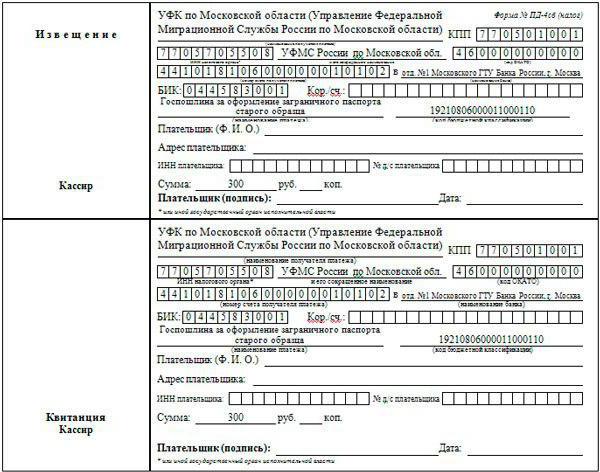State duty (GPC) - Nothing but a certain amount of money that is charged by specially authorized structures. Among them are notaries, judicial authorities, registry offices, police, state financial bodies and so on. The charge is carried out in connection with the performance of actions in the interests of individuals and organizations, as well as the issuance of documentation that is endowed with legal significance. This includes certification of wills, contracts, consideration of claims, statements, state registration of associations and so on. How does this mechanism work in the Russian Federation? What state duty for newly discovered circumstances (GIC)? How does it differ from other species? These and other equally interesting questions are analyzed in detail in this article.
State duty as an independent category

To date state duty (GPC) as a separate category is regulated by chapter 25.3 of the Russian Tax Code and is treated as a fee levied on individuals and organizations in the event of contacting state authorities, state bodies of local destination, other bodies, as well as officials authorized by legislative acts of the Russian Federation Federation, legislative acts of constituent entities of the Russian Federation and regulatory legal acts of organizations of local self-government, for the performance of certain actions for these persons, which hav e the legal value and provides the Russian tax legislation. It is important to note that the exception in this case is the actions performed by consular posts. It is necessary to add that the issuance of documentation (its duplicates) is absolutely calmly equated with actions endowed with legal significance, but the issuance of photocopies of documentation is not recognized as a legally significant action.
State duty payment (GIC)) today is reasonably included in the tax system of Russia. That is why it is considered one of the types of tax payments. What is its similarity to taxes? First, an important role here is played by the mandatory payment of state duties to the budget; secondly, this is the extension to it of the conditions for the establishment, which are general in nature and involve the identification of the payer, as well as all six links of taxation, reflected in article seventeenth of the Tax Code. With what state duty (GIC)) different from taxes? Firstly, it is necessary to take into account its target nature. Secondly, the state duty is a chargeable payment.
You need to know that the fee in question is mandatory throughout the Russian Federation, as it is federal. Offset of state duty (GIC)) is carried out in amounts that comply with one hundred percent standards for certain articles of the Budget Code. Among them are 50, 61, 56, 612 and 611 articles. Crediting occurs to the budgets of the federal and local levels, as well as to the budgets of the constituent entities of the Federation.
Actual benefits for today

In this chapter, it would be appropriate to consider in more detail state duty privileges for certain categories of legal entities and individuals.So, from the payment of the state duty, which is established by chapter 35 of article 333 of the Tax Code, are exempted:
- Off-budget funds of the state purpose of the Russian Federation; budget associations and institutions that are fully funded from the federal budget; media editorial offices (the exception here is erotic and advertising media); public organizations of a national character; associations of religious nature; political parties. The listed categories are exempted from paying the state fee for the right to use the names “Russian Federation” and “Russia”. This also includes words and phrases formed on their basis, which are used in the names of the listed associations or organizations.
- Code of Civil Procedure of the Russian Federation exemption from payment of state duty involves for courts of general jurisdiction, arbitration courts and justices of the peace. This provision is feasible when submitting (sending) requests to the Russian Constitutional Court.
- Arbitration Courts; courts vested with general jurisdiction; justices of the peace; state authorities of the subject of the Russian Federation. The listed categories are exempt from paying fees when filing (sending) applications to the charter (constitutional) courts of the constituent entities of Russia (Article 89 Code of Civil Procedure of the Russian Federation).
- State authorities at the federal level; state authorities related to the subjects of the Russian Federation; state local authorities when they apply for the implementation of actions that have legal significance. It is important to note that the exception is cases provided for by subparagraph 124 of the first paragraph of Article 333.33 of the Tax Code.
- The central banking institution of the Russian Federation - upon registration by the state of an additional issue of securities of an emission nature, the issue of which occurs to implement a single monetary policy strictly in accordance with Russian law.
What other structures are exempt from fees?

Today state duty (GIC)), in addition to the structures listed in the previous chapter, it does not pay the following categories of associations and individuals:
- Unions during the registration procedure by the state of an additional issue of securities of emission type, the issue of which is implemented to restructure liabilities to multilevel budgets (when the relevant agreement is in effect). It is important to note that this only applies when the securities specified in the clause are not only transferred, but also exchanged directly in favor of the authorized structure of the executive branch due to the provision of an agreement on debt repayment in accordance with payments to budgets of all levels.
- Calculation of state duty (GPC) it is not performed for organizations upon registration by the state of an additional issue of securities of issue orientation, which are issued into circulation only in the event of such an increase in the authorized capital that corresponds to the value of the revaluation of fixed assets. It must be added that the revaluation submitted is carried out strictly by decision of the Russian Government.
- Municipal and state museums, libraries, archives, and other municipal and state repositories of cultural property are exempted from paying the state fee for the right to export for some time cultural property that is in their funds subject to permanent storage.
- State duty receipt not provided by individuals who are the authors of cultural property. It is important to note that this provision is relevant only in the case of export of cultural property for a while.
- Individuals who are Heroes of the Soviet Union or Heroes of the Russian Federation.It should be noted that they have the right not to send money to legal costs (GIC) It is important that the relevant cases are heard in judicial bodies of a general type of jurisdiction, in the Constitutional Court or justices of the peace. If we consider the issue more specifically, then exemption from payment of state duty occurs when contacting officials and structures that carry out notarial operations.
- Legal expenses (GIC) not paid by individuals who are participants in the Second World War. It is important to add that this provision applies exclusively to cases heard by justices of the peace, in courts of general type of jurisdiction, as well as in the Constitutional Court, when applying to officials or to structures that are involved in the implementation of notarial acts, as well as to bodies that register civil acts state-level conditions.
Refund of state duty

It is important to note that the already paid state duty is refundable in whole or in part in the following cases:
- Payment of state duty in accordance with a larger amount than stipulated by tax legislation.
- When does the application return or private complaint (Code of Civil Procedure of the Russian Federation), state duty returns also. By the way, this also includes the return of a refusal to accept the submitted documentation by the judicial authorities or a refusal to carry out notarial operations by officials or structures authorized by that.
- Absolute termination of proceedings related to a particular case, or abandonment of the application document without consideration by the judicial authorities of general jurisdiction or the commercial court.
It is important to note that in the case of a settlement state duty receipt returned before the commercial court made the relevant decision. It must be added that in this case only fifty percent of the total amount paid by him is liable to the plaintiff. By the way, the provision presented is irrelevant when the conclusion of an amicable agreement occurs during the execution of an act of judicial orientation.
Additional Provisions
In addition to the above provisions, the refund of state duty occurs in the following cases:
- Refusal of persons who paid state duty from the implementation of a transaction endowed with legal significance, before contacting the official or authorized body that performs this operation.
- State duty on a passport refunded if a citizen of Russia is denied a passport for departure and entry into the country. It is important to add that the passport is an identity document of a Russian citizen outside the country. This provision is provided by law. State duty on a passport returns so when it comes to refugee travel paper.
- Notification to the applicant regarding the adoption of his application document to withdraw the application for registration of a program for electronic computers, as well as databases.
What state fees are non-refundable?

It is important to note that today the state duty paid for the registration of the marriage by the relevant state authorities, its dissolution, name change, amendments and amendments to the records of current acts of civil status when the listed events were not subsequently organized is not refundable. It is necessary to supplement that state duty details here are slightly different from those indicated in cases of state duties to be returned.
State duty refund application
The payer submits the application for the return of the excessively collected (paid) state duty amount to an official or to the body that is authorized to perform actions endowed with legal significance, for which the state duty was recovered (paid).
It is important to know that the application document regarding the return of the excessively collected (paid) state duty amount is somehow attached to the original payment documents when the state duty is to be collected in full, and when it is partially returned, instead of the original payment documents, which are indicated state duty detailscopies are submitted.
Deferral or installment payment of state duty
In this chapter, it is advisable to consider installment or deferral of payment of a certain amount of state duty. Current legislation spells out the following provisions:
- According to the Civil Procedure Code, deferred payment of state duty or installment payment is granted today strictly in accordance with the request of the person interested in the operation within the period established by paragraph 1 of Article 64 of the current Code.
- For the amount of state duty in respect of which installments or deferrals are granted, no interest is accrued throughout the entire period for which installments or deferrals were granted.
Installment or Deferral Procedure

This chapter discusses in detail the conditions and procedure for granting installments or deferrals for payment of different levels of state fees to state budgets. The most important items to date have the following points:
- An installment plan or a deferment related to the payment of a state fee is a change in the period of payment of a state fee if there are reasons that are provided for by applicable law for a period not exceeding twelve months in any case. It is important to add that in this case a person pays a certain amount of debt either at a time or in stages.
- Installments or deferrals in accordance with the payment of the state fee, which is credited to the federal budget for a period of one to three years, may be granted strictly by decision of the Russian Government.
It is important to note that an installment plan or a deferment in payment of a state fee may be granted to a person who has shown interest, at least for one of the following reasons:
- Causing damage to a person after a technological disaster, natural disaster, or other circumstances endowed with force majeure.
- Delay to this person in terms of financing from the state budget or paying for an order he executed from the state or officials who are in compliance with the regulations.
- The threat of signs of bankruptcy (economic insolvency) of a person expressing interest in case of paying a one-time state duty, as well as approval by the commercial judicial authorities of a debt repayment plan or settlement agreement in the process of financial recovery.
- Then, when the position of an individual in terms of property absolutely excludes the possibility of a one-time payment of state duty.
- Then, when the production and subsequent sale of marketable products by a legal entity is seasonal. It is necessary to add that the list of varieties of activities and industries that are endowed with a seasonal nature is strictly approved by the Russian Government.
- There are good reasons for installment payment or deferred payment of the state duty payable due to the movement of goods across the Russian customs border established by the current Customs Code in Russia.
When is the state duty not paid at all?

To date, in the Russian Federation, the payment of the state duty in terms of the customs procedure is excluded altogether in the following cases:
- Issuing an invitation to enter Russia for a stateless person or a foreign citizen to study at a municipal or state educational institution.
- Extending the period of validity of a permit corresponding to the temporary stay in Russia of a stateless person or a foreign citizen who arrived in the Russian Federation to implement charity or deliver humanitarian aid.This also includes the situation when arrival occurs due to circumstances related to the need for emergency treatment, the death of a close relative or a serious illness.
- Removal of cultural nature values that were previously claimed from someone else’s possession made illegally and are now corrupted by the true owner.
- State registration of arrests, their termination in relation to real estate.
- State registration of a mortgage that arose on the basis of a legislative act, as well as the cancellation of a registration mark regarding a mortgage.
- State registration of an agreement regarding a change in the content of a mortgage.
- Issuance of a passport of a citizen of the Russian Federation to children without parental care, as well as to orphans.